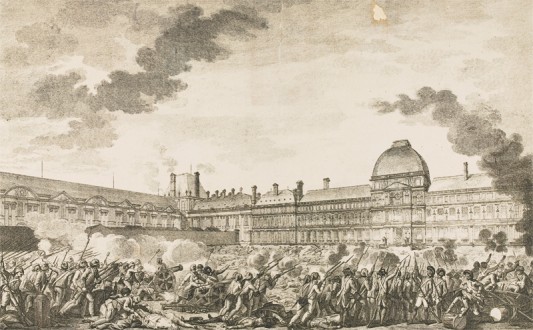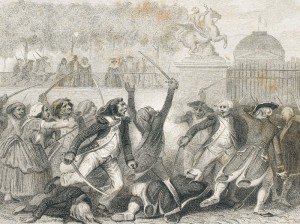The Volunteers of 1792
On 8 June 1792, as France was waging war against Austria, Prussia and Hungary, the French Legislative Assembly ordained and enacted that a camp of 20 000 National Guards be created on 14 June 1792 “considering that it would be beneficial to strengthen the fraternity links between the provincial National Guards and that of Paris.” Although the king vetoed the decision, the Assembly overrode the king’s veto.
The Song of the Marseillois
On 25 and 26 June, the municipality of Marseilles gathered some five hundred volunteers whose majority were from Marseilles–at the time spelt “Marseillois”–along with men coming from the department of the Bouches du Rhône. On 22 June, during a patriotic meeting attended by many Marseillais, Étienne-François Mireur (1770-1798), an active member of one of the clubs of the Friends of the Constitution, sung the Song for the Army of the Rhine for the first time. The following day, the lyrics of the song were printed in the Journal des Départements Méridionaux et des Débats des Amis de la Constitution. Copies of the song were distributed to the enlisted military men who were leaving Marseilles. This detail entails that they were literate or that they could learn the lyrics with the help of one of their companions. The song that was sung all along the road to Paris made them famous, and became known as “The Song” or “The March of the Marseillois”, and later on La Marseillaise. They reached Paris between 29 and 30 July where they formed with the Bretons one of the largest battalion.
The Attack on the Tuileries -10 August 1972
Following King Louis XVI’s fatal failed flight to Varennes in 1791, the king and his entourage were brought back to Paris and confined to the Palace of the Tuileries. Following the military defeat inflicted to the Revolutionaries by the armies led by the foreign princes who were moving towards the French borders, King Louis XVI had tied all his hopes to the prospect of a foreign intervention that would put an end to the Revolution. Demands were made for the debasement of the king.
During the insurrection that took place on 10 August 1792, the King was transferred to the Legislative Assembly while, at the same time, the National Parisian Guard who had united with the Federates (from Brest and Marseilles) stormed the Palace of the Tuileries and overpowered the nine hundred and fifty Swiss guards stationed there. The Legislative Assembly pronounced the debasement of the king: thus marking the end of the French Monarchy. In order to “ensure the sovereignty of the people and secure Liberty and Equality” the people called for a new single-chamber assembly to succeed to the Legislative Assembly and named it the National Convention.





Ajouter un commentaire